I heard the argument recently that if someone says that they “can’t cook,” then immediately, it puts a question mark on their ability to do anything else. Because cooking, cooking well, requires intuition, a sense of timing, the ability to problem solve, patience, curiosity, and a whole slew of other skills that are inherently necessary for almost anything, really.
I have to say, I’m inclined to agree.
One’s ability to cook — or, more accurately, willingness to cook — is a great barometer for who they are as a person. As the Stoics and Rick Rubin point out, how we approach anything is often how we approach everything. Preparing a meal requires you to plan and prep; requires a degree of physical dexterity and mental timing; requires the patience to let things progress and the creativity to change course if things go sideways. The level of attention required to make a good meal, especially when cooking for others, is perfectly transferable to most other pursuits.
Being a “good cook” is great, of course, but you don’t need to be Francis Mallmann to portray these traits, to pass the proverbial sniff test. Just the openness to attempt to cook is mostly good enough for me. Cooking, like any skill, is something you can improve upon, something you can get better at, with practice.
Fellow writer1
recently asked me where I learned to cook. I’ve written tangentially on this topic before, alluding to how Nana CWD barely let us in the kitchen growing up, how watching Chopped shaped the way I think about using ingredients, how I’ll use different sources for inspiration. But really, I learned to cook mostly through trial and error. I spent a lot of time reading different recipes2, trying to recreate them as best I could on a short budget and woefully understocked kitchen. But, through sheer will, eventually, I found my way into some degree of competency — and, like we should do with everything, I try to bring that level of competency into the rest of my life3.A few weeks ago, I mentioned that risotto is a dish near and dear to my heart. Mushroom risotto, in fact, is the dish I made when I proposed to Mrs. CWD. But before it was our proposal dish, it was the first “fancy” meal I learned to cook.
Presented as “a dish to impress a date,” chronicled as part of a series on “things every man should be able to do,” and featured on the Brooks Brother’s blog4, of all places, mushroom risotto has been a mainstay of the CWD kitchen for over a decade. It was even featured as one of the first recipes on CWD, two-and-a-half years ago. Given we typically enjoy it with scallops, and given we procured some live, in-shell ones from Vertical Bay in Penobscot Bay, Maine it seemed only fitting we make it again.
So Alex, to answer your question: I learned how to cook by making this recipe. Give it a shot: cook it enough times, and maybe, one day, you, too, can include imprecisely written recipes alongside your essays!
Start by dicing an onion and several cloves of garlic. In a sloped-walled pan, heat a good glug of olive oil; when hot, add the garlic and onion. Cook until just translucent, and then add two to three handfuls of rice5. Cook, stirring often, until the rice starts to glisten, and then add a pour of white wine and a squeeze of lemon.
As the liquid evaporates off, start adding several ladlefuls of mushroom stock6. Cook for about twenty minutes, adding stock as it cooks off, but not too much at a time, until the rice is nearly al dente. At this point, add chopped mushrooms7 and finish cooking. Grate in a bushel of Parmigiano cheese and give a final stir.
Clean, shuck, and prep your scallops8. Pat them dry, then dust both sides with salt, pepper, and flour. Heat a knob of butter or ghee9 in a cast-iron pan, and cook the scallops until the outer edges are browned and barely cracking, the inside smooth and just touched by the heat.
Serve the scallops over the risotto, and enjoy.
Since we’ve made it already so recently, I don’t have too much more to add on the subject of risotto. I’ll just reiterate that I love it in all forms and this one remains quite special to me.
What I will close by pontificating on, however, is what struck me most about shucking the scallops: we leave a lot of literal and proverbial meat on the table when we just eat the main muscle10! Tune in next week for what we cooked with the trimmings11.
Ill leave you here to enjoy your weekends. Whether you like it or not, the functional summer is over. Buses are on the roads in the morning; the air is crisp; hunting season starts in just under a month. I saw a house last week with pumpkins set out on their stoop. Just another reminder that time and life move quickly — make sure you’re stopping every once and awhile to appreciate them.
Alex recently wrote a lovely piece about coming to view himself as a writer, which you can find here.
One gets better at cooking in the same way one gets better at writing: copying from stuff you like until you find your own voice.
Interestingly enough, I think as I started cooking more and more, it made me — and I’m stealing Alex’s words here — into a more “integrated, cohesive, [maybe] authentic” person. As one puts more thought into the way one approaches a specific skill, it’s impossible for that to not transfer over to everything one does. Writing this newsletter has only compounded this effect. If I were to make this into an advice column, I’d encourage everyone to try and find something in their life like cooking which they can use as a whetstone, to hone the rest of their self.
Writing this newsletter each week, by the way, does much the same thing.
I spent about an hour trying to find this recipe in the archives of the internet and finally did, after finishing writing up the recipe. And jeez — Brooks Brothers showed me up. Their version is even breezier than mine! Here’s the link from the Wayback Machine, and here’s the instructions:
Mushroom Risotto
The key to this recipe is surprise. The ingredients are mostly non-perishable or have a very long shelf life. When you have an unexpected dinner guest, wow them by whipping up a delicious risotto from the contents of your poorly stocked cupboards. You’ll require:
• 4-6 cups chicken stock
• 2 T olive oil
• 1 medium onion
• 1 clove garlic finely chopped
• 2 handfuls of Arborio rice
• ½ cup dry vermouth
• 1 bay leaf
• ½ cup freshly grated Parmigiano-Reggiano
• 1 package of dried mushrooms
• Salt and freshly ground white pepperMake yourself a drink. Then bring the chicken stock to a low simmer in a saucepot and add the dried mushrooms. Heat olive oil in a separate large saucepot over medium heat. Sauté the onions and garlic until translucent. Add the rice and bay leaf and stir until well coated with the oil and just slightly browned. Add vermouth and simmer until the rice absorbs the fluids. Don’t forget your beverage. This is a good time to pause and “hydrate.” Remove the now reconstituted mushrooms from the stock, give them a rough chop and set them aside. Slowly ladle enough stock to cover the rice (about 1 cup) and continue to simmer. Stir often and add more stock as it is absorbed. Cook the risotto for about 15-20 minutes, until the rice is moist but not runny. Stir in the mushrooms and cheese and season with salt and pepper to taste.
Serve. Enjoy. Impress.
Arborio is the preferred here, but we tried Carnoroli this time. I didn’t like it as much.
I forgot to take pictures of this part, but here’s how to make it: bring stock or broth, preferably homemade, to a simmer and add several bags of dried mushrooms. Let that simmer until the mushrooms have rehydrated — then remove the now soggy mushrooms. Bam — mushroom stock.
These are the ones you reconstituted.
Presumably you’re going to get yours with this already done, but in case you recently went scalloping, go ahead and clean them.
Or bacon fat if you’re a glutton.
See the picture in-line with the recipe. All that stuff in the left hand bowl is edible — and yields way more than the “scallop” part.
Gma CWD included, believe it or not!


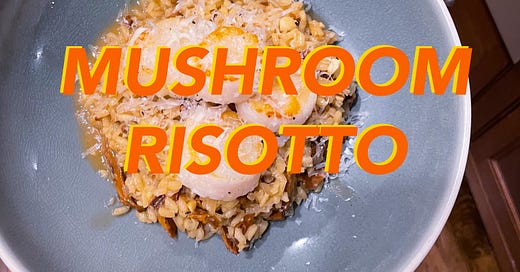




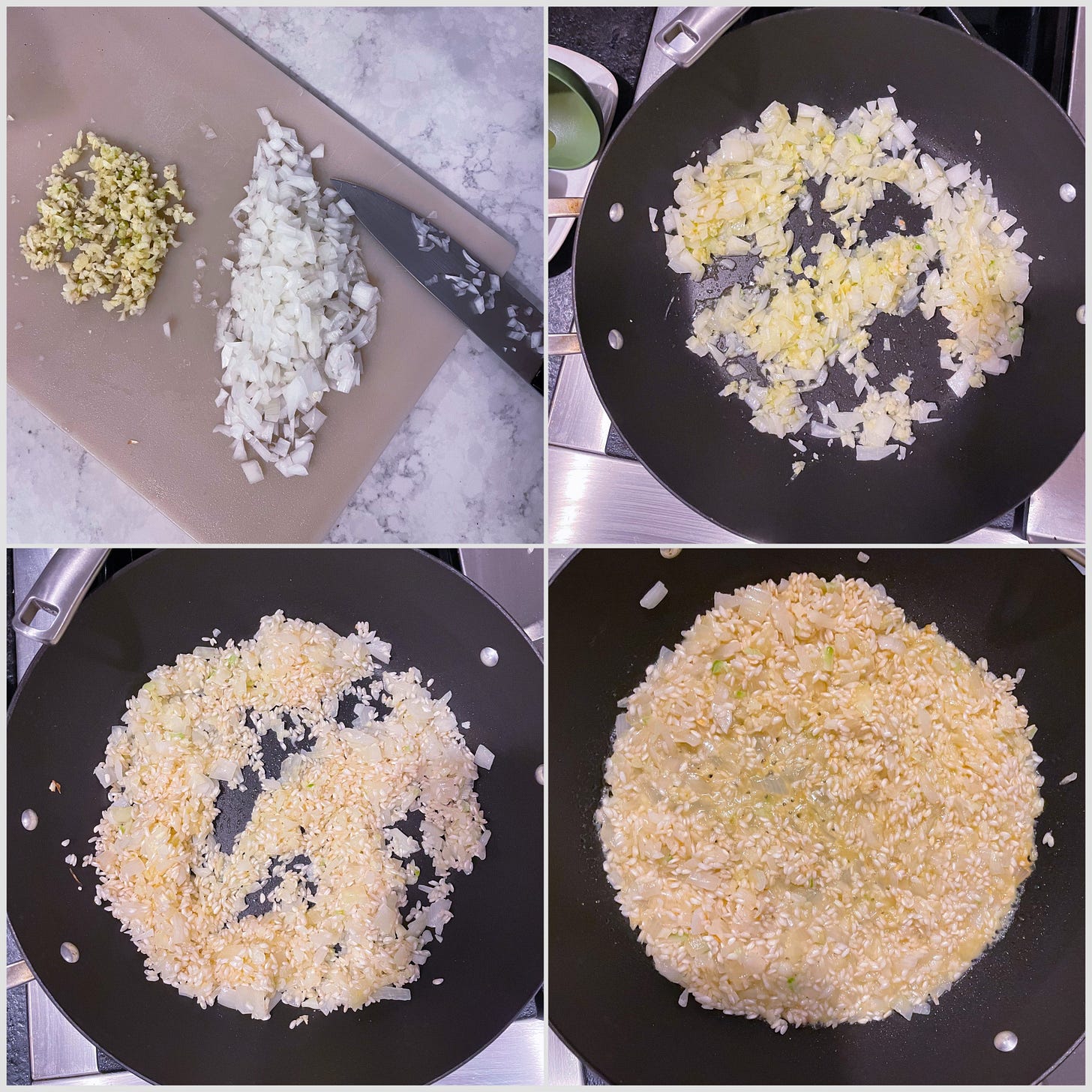
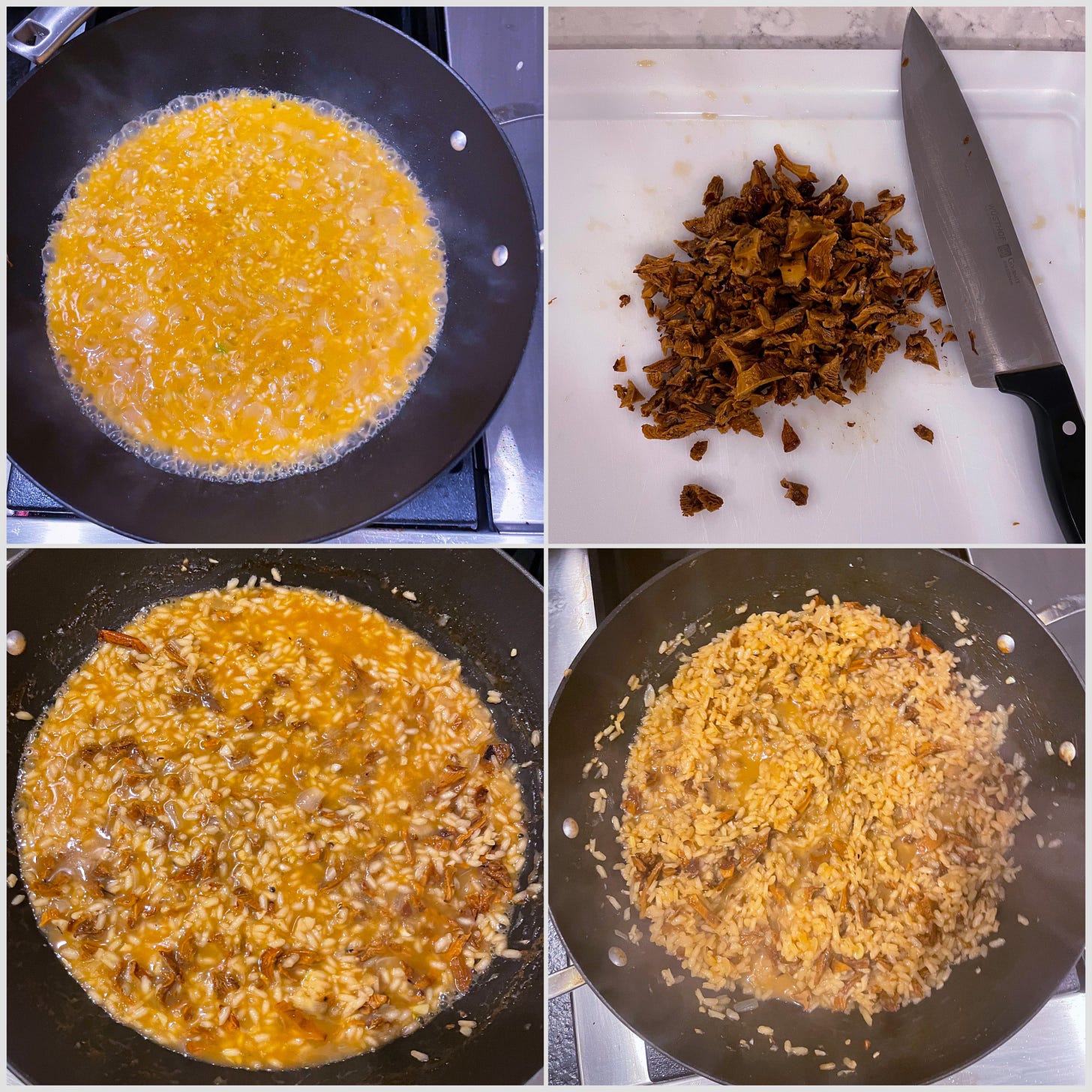
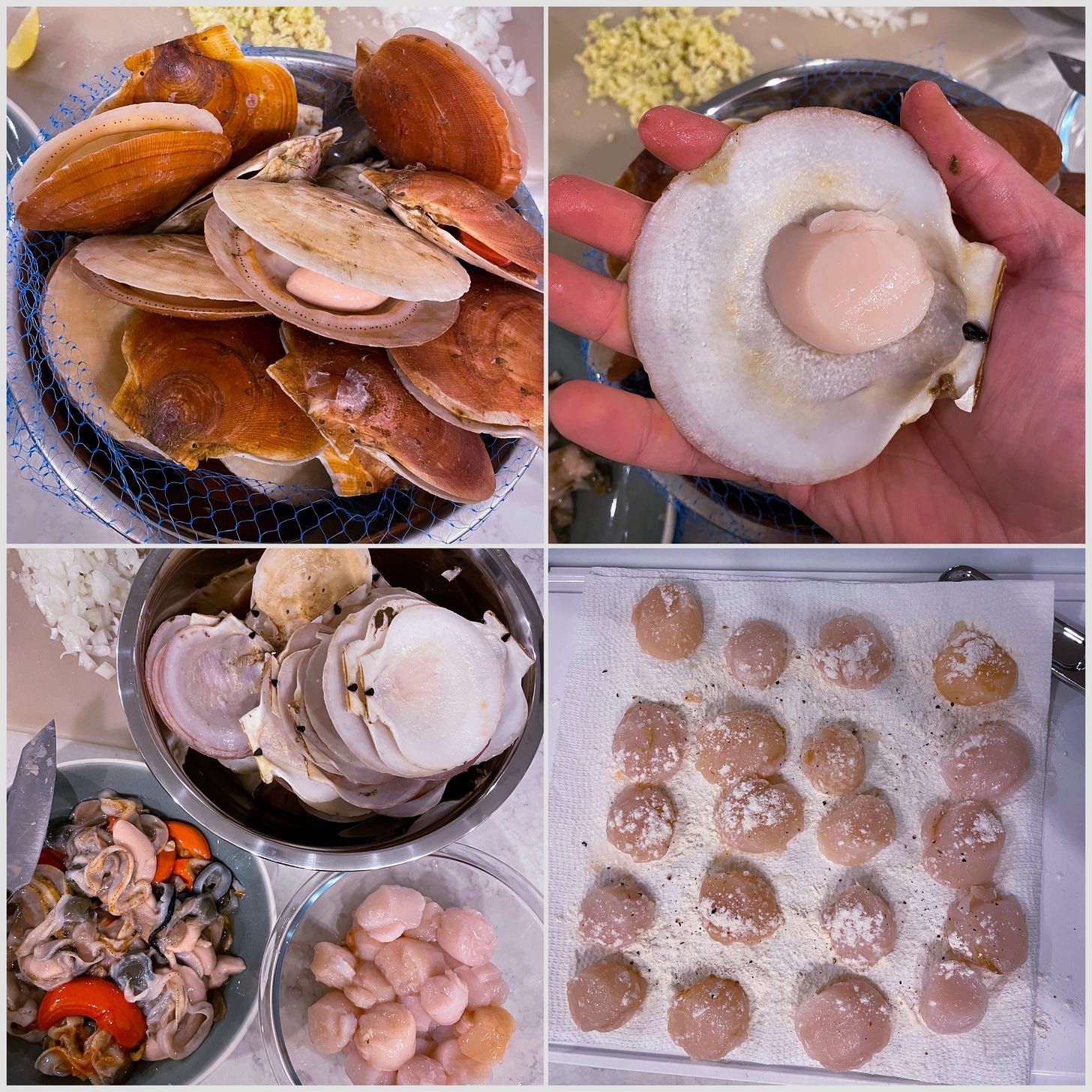
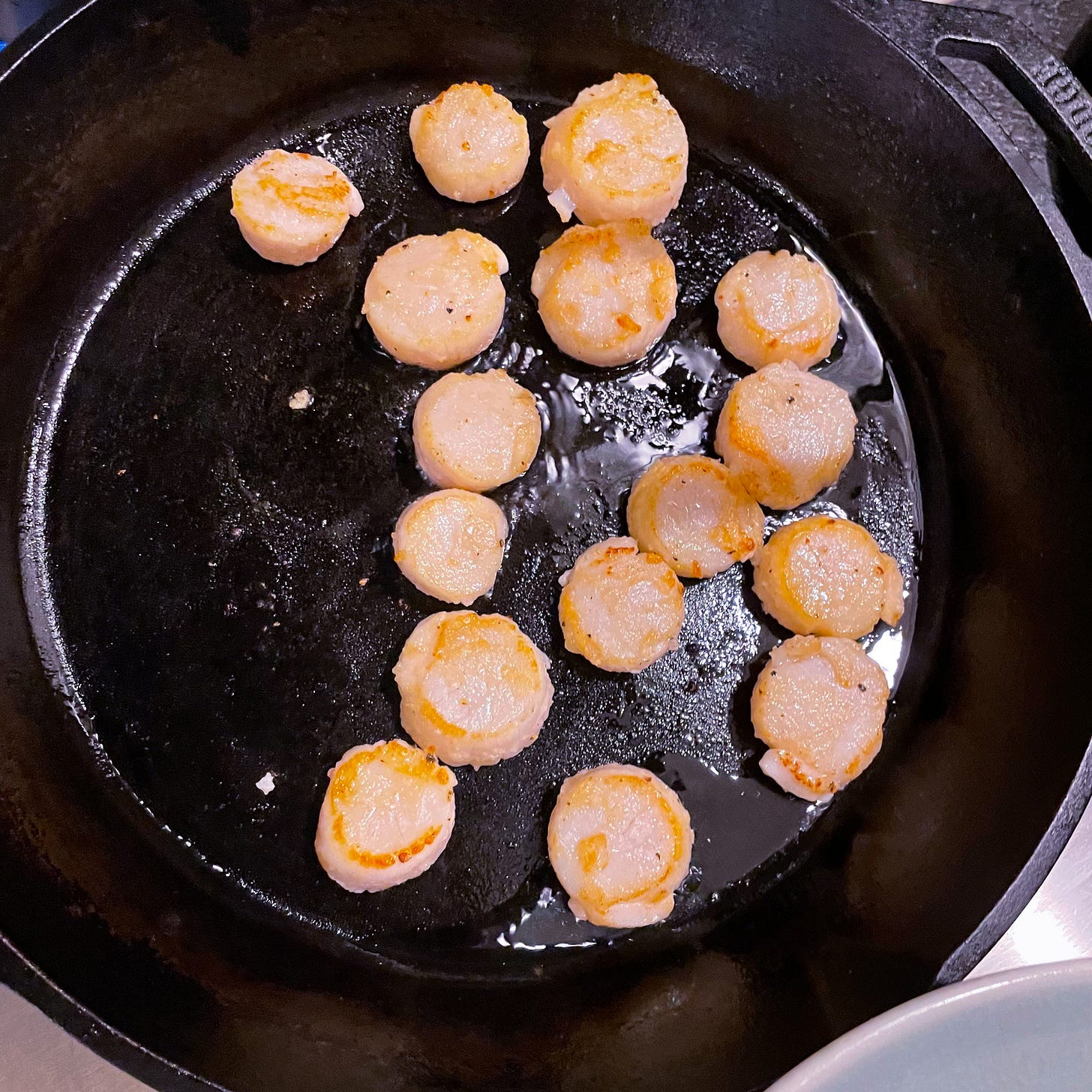
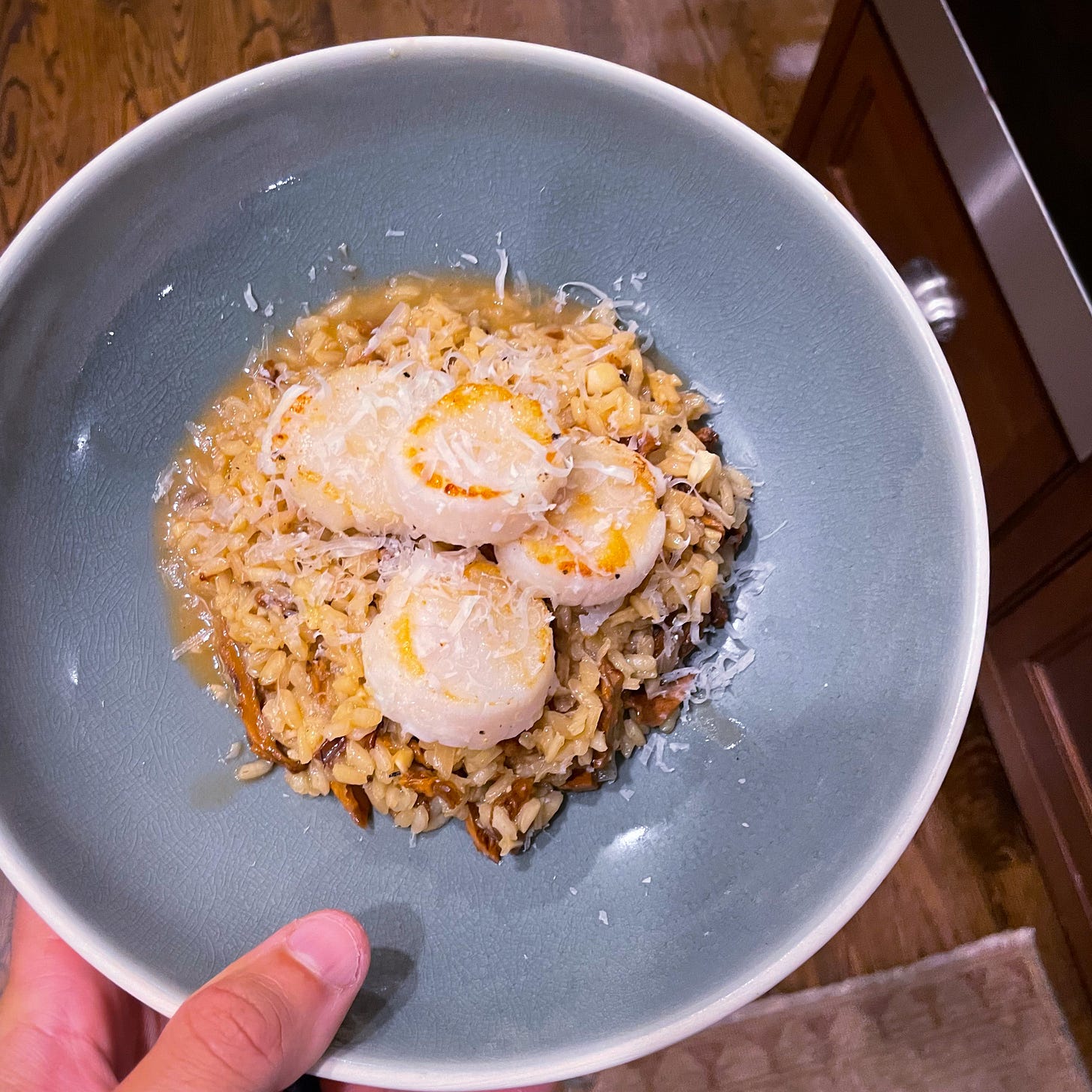

Yes!! I've been pumped for this one Lou. Wonderful reflection, as expected.
The older I get, the more I have (begrudgingly) adopted the belief you talk about - that how we do anything is how we do everything. That has meant facing some things I don't particularly like about myself. I developed a habit of doing many things in life hastily and thoughtlessly. I'm not sure exactly why this is, yet; it's something I've started to write about. I told myself that I did things hastily to make ample space and time for the things that matter most, and while I still think that's true, I also can't ignore the fact that those tendencies permeate into everything.
Cooking is a perfect example of this, as you astutely point out. It's a mirror of sorts. I have some baseline competence in the kitchen - I picked up some stuff by osmosis from my dad, who has had a few restaurants - but I don't cook often and don't have much confidence in my ability beyond the basics. Sometimes that bothers me, and I think it's because of what you've articulated here, that it's an accurate microcosm of how we live. I'm trying to apply the ethos you described, building competence through trial and error and sheer will, to all facets of my life going forward. It's a work in progress.
All of this is to say, great piece and thank you for inspiring a reflection I needed.
Also the risotto looks killer and I would like to try to make this when I get back stateside
This still seems a little complicated for me--I am not good with making rice first off--but this looks outstanding! You owe me this meal, even before the gnocci's you will be re-creating for me!
I love you!!!!